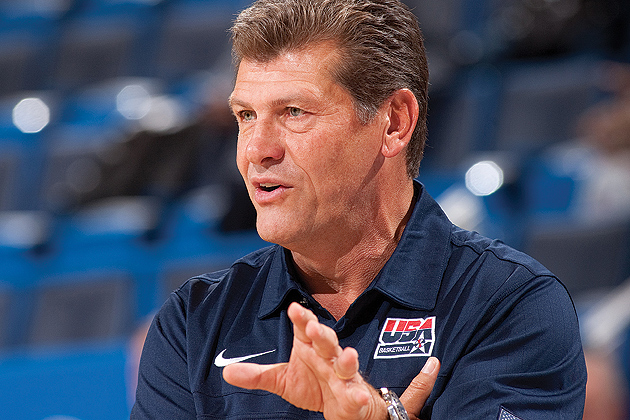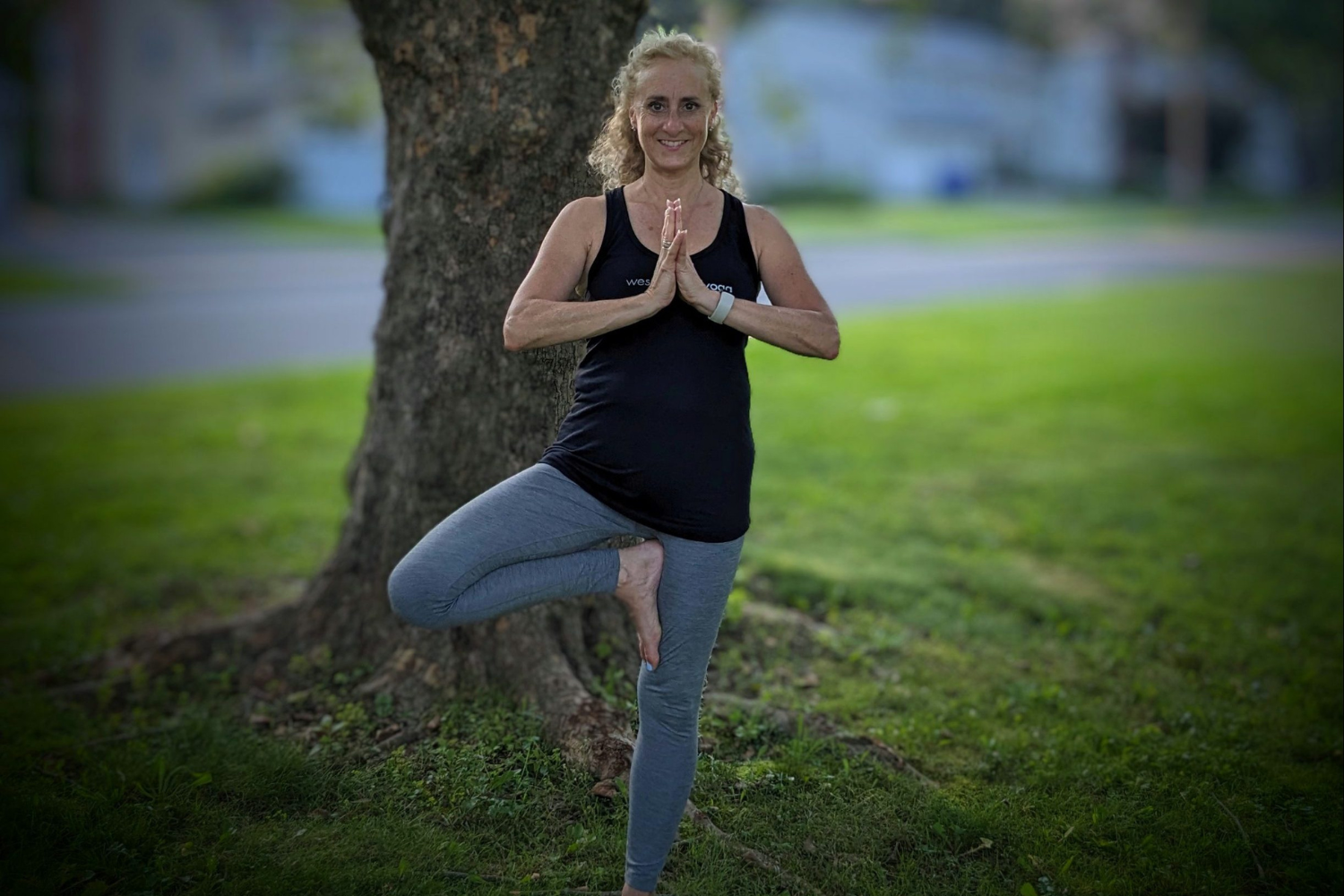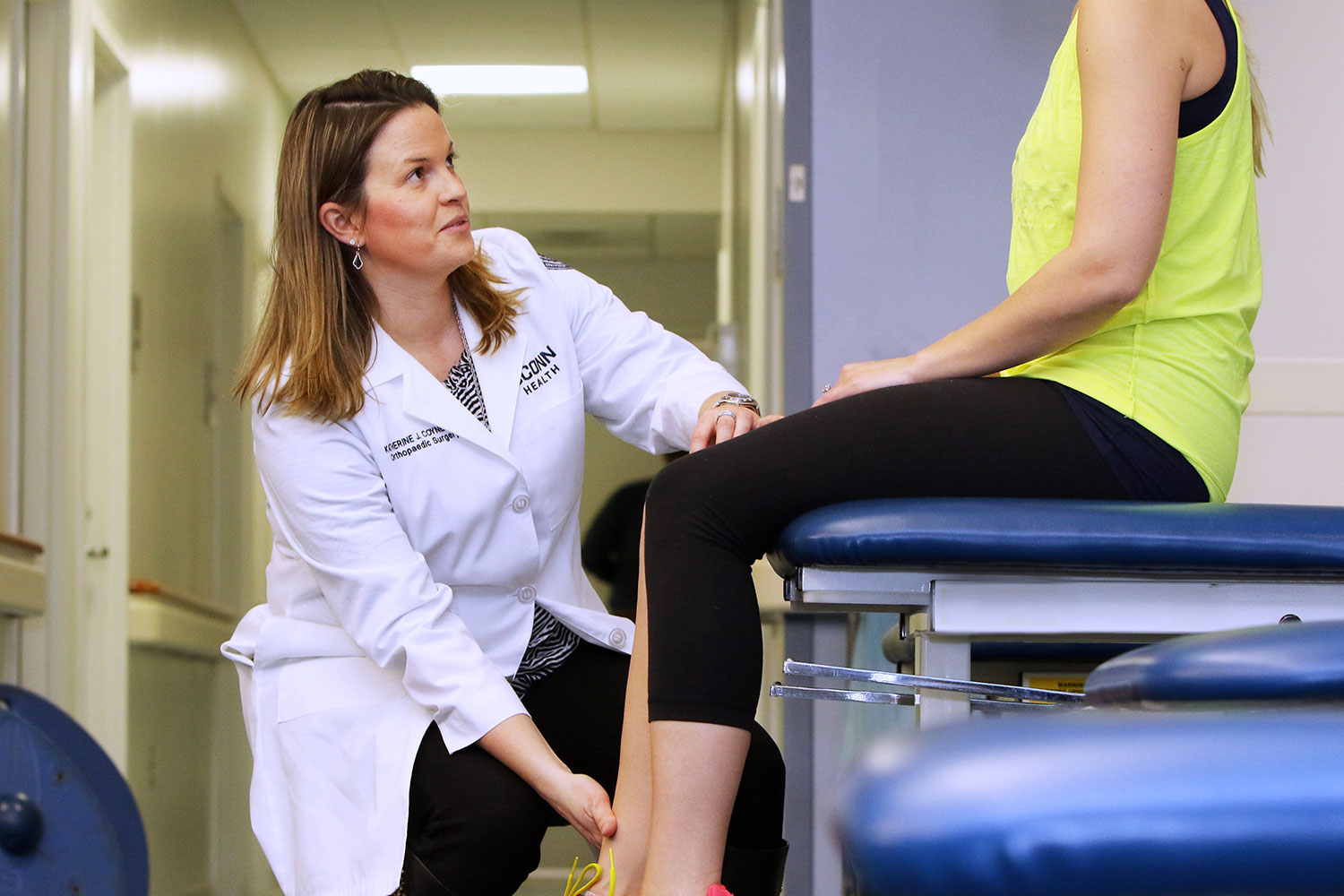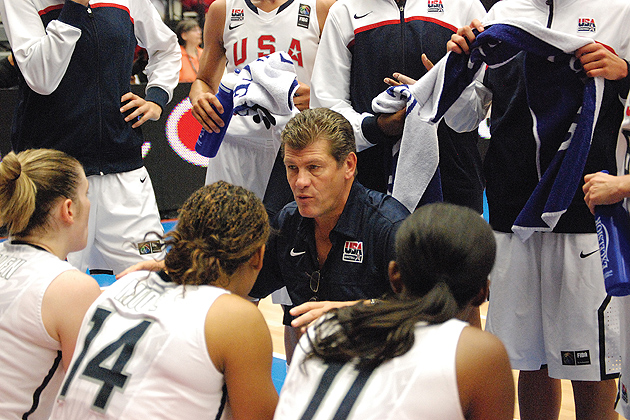
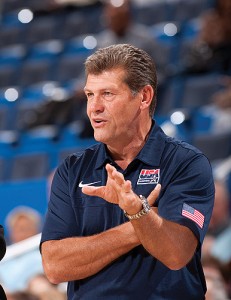
For 11 days during the fall of 2010 in the Czech Republic, the best women’s basketball teams in the world battled for the 2010 FIBA World Championship. As the tournament wound down, the host team from the Czech Republic made a Cinderella run, beating Australia and Belarus for a chance to win a gold medal and qualify for the 2012 London Olympic Games.
As the first half of the championship game against the USA Basketball National Team came to a close, the Czechs had cut the United States’ 12-point lead to five. In a scenario all too familiar to Huskies fans, in the second half USA Basketball went on a 20-4 scoring burst en route to an 89-69 win, qualifying the USA for this year’s Olympics.
Although his career has been filled with pressure-cooker moments, USA Basketball head coach Geno Auriemma says that moment was his most stressful.
Additional audio:
Ann Donovan
Geno on becoming Olympic coach
Geno on his players
Geno on pressure of winning
Sue Bird on Geno’s trust
“When we won that championship,” says Auriemma, head women’s basketball coach for the Huskies, “it was the most pressure, most fatigued, most mentally and physically exhausted I’ve ever been in my professional life.”
That might sound odd coming from a Hall of Fame coach whose teams have won seven NCAA Championships, posted four unbeaten seasons, and whose fans wring their hands when a season ends with anything less than a trip to the Final Four. However, Auriemma’s drive for perfection in Storrs is precisely why USA Basketball selected him as the first college coach to lead the Women’s National Team since WNBA players have made up the majority of the squad.
“There’s probably a lot of similarities being head coach at UConn and being the head coach of USA Basketball,” says Jim Tooley, executive director and CEO of USA Basketball. “UConn’s had great success; USA Basketball has had great success. With that success comes the expectation of continued great success.”
Auriemma has been involved with USA Basketball since 1993, when he served as head coach for the U.S. Olympic Festival West Team. He subsequently served as head coach for several other Select and Junior teams and was an assistant coach on the 2000 U.S. Olympic Team that won the gold medal under Nell Fortner of the WNBA’s Indiana Fever. It was the first time the women’s team was led by a professional coach and was similar to the men’s team in that it included primarily NBA players. But after the men’s National Team failed to win a gold medal in international competition since the 2000 Olympics, in 2005 USA Basketball Men’s National Team managing director Jerry Colangelo selected Mike Krzyzewski of Duke as the team’s head coach.
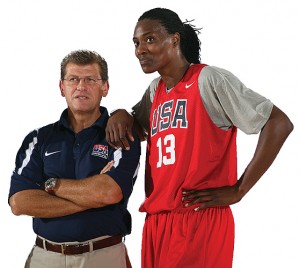
Auriemma says that since he had no interest in coaching in the WNBA, he had put any thoughts of being the head coach for the Women’s National Team out of his mind – that is, until Krzyzewski was named to lead the men’s team.
“I remember saying, ‘You know, if he wins, they might go to a college coach for women,’” he says. “Lo and behold, he wins, and the next thing you know, here comes the opportunity.”
For Auriemma to coach an Olympic team is more than just the honor most would expect; it is an example of the American Dream. He came to the U.S. at age 7 from Montella, a small village east of Naples, Italy, where there was no electricity. As he wrote in his 2006 book, Geno: In Pursuit of Perfection, “I arrive in Norristown, Pennsylvania, and I don’t know the language. I don’t know the customs. I don’t dress the right way. I feel out of place, so I’m constantly self-conscious and unsure of myself.”
That uncertainty became a motivating force for Auriemma, who pushed himself not only to learn but also to excel at the things he did not know. He has said that the young women he coached early in his career bore the brunt of the emotional scars left by his own self-doubt. Auriemma insisted that his student-athletes fulfill the potential that he saw in them, even if it meant tossing them out of practice when they were not working hard enough, as the seven National Players of the Year and 13 First Team All-Americans he has coached will attest.
“I push my players to go beyond pretty good,” he says. “Some understood; some didn’t. I probably do it a different way today because I don’t have the burning desire or need to prove anything to anybody. Maybe I’ve mellowed out.”
As the USA Basketball National Team head coach, however, Auriemma faces several challenges – coaching a team of talented players who have not played together for very long, working with a team of assistant coaches who lead their own programs, and the understanding that his success will be measured by only one outcome: Olympic gold.
The USA Basketball Women’s National Team Player Selection Committee has announced that five former Huskies will be members of the U.S. Olympic Women’s Basketball Team for the 2012 Olympics in London this summer.
The U.S. team, to be coached by Geno Auriemma, will include Sue Bird ’02 (CLAS) of the Seattle Storm, Swin Cash ’02 (CLAS) of the Chicago Sky, Tina Charles ’10 (CLAS) of the Connecticut Sun, Maya Moore ’11 (CLAS) of the Minnesota Lynx, and Diana Taurasi ’05 (CLAS) of the Phoenix Mercury. Other members of the selected team include Seimone Augustus of the Minnesota Lynx, Sylvia Fowles of the Chicago Sky, Candace Parker of the Los Angeles Sparks, Angel McCoughtry of the Atlanta Dream, and Lindsay Whalen of the Minnesota Lynx. One slot remains for the eventual 12-member U.S. squad, and the final athlete will be selected at a later date.
Participation on a USA Basketball Team is by invitation only. Competition committees select athletes to participate in team training as well as the final 12-member team. The Women’s National Team process is complicated by the fact that most professional players spend time in the WNBA during its summer season and then play in European leagues for the fall and winter, leaving limited time to bring players together for training camps, practices, and games before Olympic competition. The WNBA will take a mid-season break for the Olympics, and the team leaves for London in mid-July for the 2012 Games that will take place from July 28 to Aug. 11. Auriemma will gather his team in Washington, D.C., for a brief training session and an exhibition game against Brazil before going overseas.
The USA Basketball National Team roster of 27 players selected to compete for the FIBA World Championship had seven current or former Huskies, six of whom played on the team that won the FIBA gold medal against the Czechs in 2010. They included Sue Bird, Swin Cash, Tina Charles, Maya Moore, Diana Taurasi, and Asjha Jones ’02 (BUS). The seventh, Renee Montgomery ’09 (CLAS) of the Connecticut Sun, was not a part of the USA World Championship Team, but was on the roster for the National Team’s 2011 European tour and in the player pool for London.
For both Auriemma and his former student-athletes, the chance to reunite on the court was an unexpected surprise.
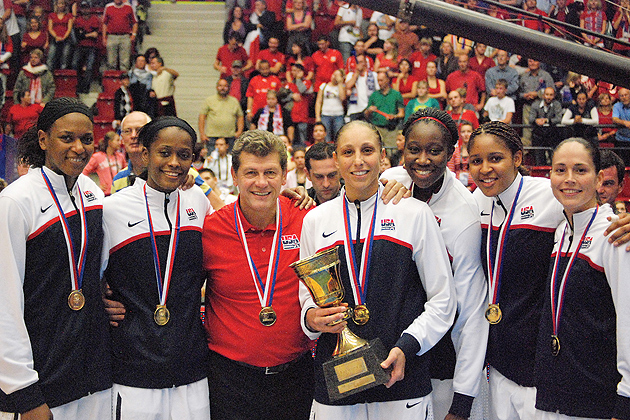
“Being back on the floor with [Coach] was fun, exciting, and easier versus college because I know what he expects of me,” says Charles, the 2010 WNBA Rookie of the Year.
Bird – arguably the leading point guard in the world, having won two NCAA titles, two WNBA titles, and two Olympic gold medals – says being on the court with her former teammates and other Husky alumni was comfortable, “as if no time had passed.” During the FIBA World Championship, she was heartened by the confidence Auriemma placed in her and Taurasi in leading the USA National Team during critical times in the games.
“It’s a great feeling,” Bird says. “To know that he trusts me and Diana feels really good. He doesn’t do that with anybody. You have to earn everything with him. He puts you in these impossible situations [in practice], where even he doesn’t think you can be successful. With that, we gain his trust, and from there, you really are able to go out on the court and play at a really high level.”
Auriemma says he looked forward to the chance to coach his former players so he could see firsthand how much they had changed since leaving Storrs.
“I wanted to see how much more they are capable of doing [now] than when they were playing for me,” he says. “I know Diana is good. So now when I go out and watch, I think: Damn, I didn’t know she had gotten this good. I knew what Asjha could do here every day. Now I go out there, and it’s the same Asjha Jones doing the same things, except better.”
In addition to the UConn alumnae, Auriemma has what amounts to an all-star roster of WNBA players: Jayne Appel (San Antonio Silver Stars), Tamika Catchings (Indiana Fever), Candice Dupree (Phoenix Mercury), Kara Lawson (Connecticut Sun), Angel McCoughtry (Atlanta Dream), and Lindsay Whalen (Minnesota Lynx). However, the USA National Team must also be a team of players who have the complementary skills needed to win Olympic gold.
“It’s not just automatically the 12 best players, because you might not have any point guards,” says Bird. “You’ve got to pick the right fit.”
Auriemma says having so many of his former players on the USA National Team helps other players understand his sideline instructions when he is outlining a strategy in the terms he uses each day at UConn. Often, he says, a former Husky will quickly translate “Geno-speak” into “WNBA-speak.”
“I can’t tell you how many times one of my former players stick their head in the huddle and say: ‘Yo! This is what we’re going to do,’” he says. “At Connecticut, I go, ‘Let’s do this,’ and there’s a 50-50 chance it might not happen. I call time-out with the National Team, there’s not a 50-50 chance it’s going to happen: It’s going to happen, because they’re that good. It’s utopia for a coach, because for whatever you think up, it’s going to happen.”
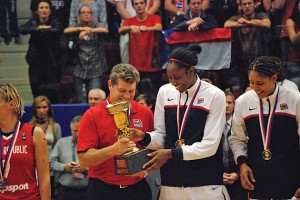
Working with a team of head coaches serving as assistants is another challenge for a USA Basketball head coach. Auriemma’s assistant coaches include Jennifer Gillom of the Washington Mystics, Marynell Meadors of the Atlanta Dream, and his close friend Doug Bruno of DePaul University, who says working together is a learning process for the entire coaching staff.
“He teaches the game very, very well. It’s been just a great experience to be next to him and watch him relate [to the players],” Bruno says. “I’ve learned little by little to the best of my ability to assist him and help him to be the best he can be. It makes you understand what your assistant is going through. He’s trying to respect the fact that I’m a head coach, but I’ve told him, whatever you want me to do, tell me and I’ll do it. During the game, you don’t want to overstep; at the same time, you don’t want to hold something in that’s going to be helpful.”
Auriemma says he is doing with his USA assistant coaches much of what he does in Storrs – asking his coaching staff for suggestions and ideas, so they know the situations when they should voice a strong opinion.
“I’m constantly asking: ‘What have you got? What do you think? What’s your take on this?’” he says. “It’s just trying to figure out what their strengths and weaknesses are; the things they can contribute.”
Yet, even with players considered the best in the world on the roster, and an experienced coaching staff, the pressure to return home from London with a gold medal remains. The celebration by Ros Casares Valencia’s fans of its team’s four-point win over the USA National Team in Spain during the European Tour in October is a case in point.
“I felt his pain,” says Anne Donovan, who led the 2008 USA National Team to gold and now is head coach at Seton Hall. “You’re in Europe, where everyone is making a big deal of it. Geno, more than anybody, can keep things in perspective. The ultimate reward is when he gets to London. There’s nothing like the pressure, the responsibility, or the experience.”
Krzyzewski calls the selection of Auriemma to lead the Women’s National Team a “brilliant choice,” because Auriemma fosters the kind of environment for players that USA Basketball tries to establish and, as a college coach, has successful experience in the NCAA Tournament format.
“The advantage of having college coaches leading the national teams is that they are used to the one-and-done format because of the NCAA Tournament,” Krzyzewski says. “It is the same in the international game. That type of thinking and preparation helps in the international format. You’re expected to win and earn the respect of the world. That pressure needs to excite you, not inhibit you.”
Last summer, Auriemma traveled to Chile to watch the most celebrated branch of his coaching tree, University of Hartford head coach Jennifer Rizzotti ’96 (CLAS), lead the USA U19 National Team to a gold medal in the FIBA U19 World Championship. There, they discussed his learning process over the past two years having responsibility for the National Team.
“He talked about how hard it is to win, to keep that situation and atmosphere light so [the players] are relaxed,” says Rizzotti, who was named 2011 USA Basketball National Coach of the Year. “It’s like playing in a conference tournament and a Final Four every day. You have to find the energy as a coach to get up for a championship [game] every day.”
Auriemma will, however, have the comfort of knowing that most of his players have the experience of winning championships. He provides an example from the FIBA World Championship series, when during the medal round his team was struggling and he needed to shuffle the lineup. He summoned Swin Cash and Asjha Jones to enter the game, telling them, “Show these kids how we win championships.”
“[It’s] the comfort level of looking down the bench and looking at kids that you know have done it,” he says. “You put your confidence and trust in them. That’s what coaches pray for.”
In April, USA Basketball announced its final roster, which included the six former Huskies who were part of the FIBA World Championship team – Bird, Cash, Charles, Moore, Taurasi, and Jones, who was the last player named to the team. Other team members include Seimone Augustus of the Minnesota Lynx, Catchings, Sylvia Fowles of the Chicago Sky, McCoughtry and Whalen.
